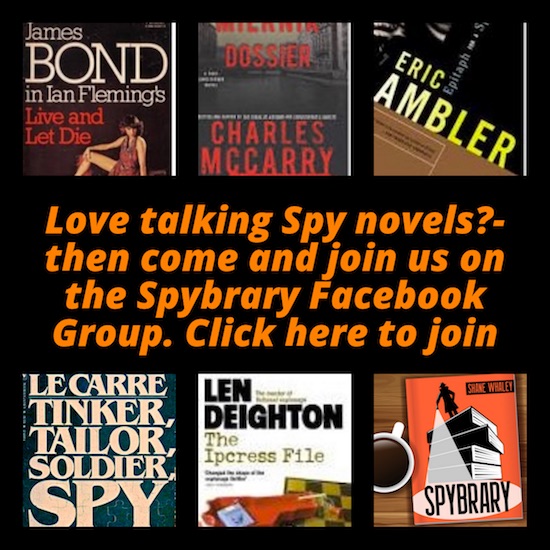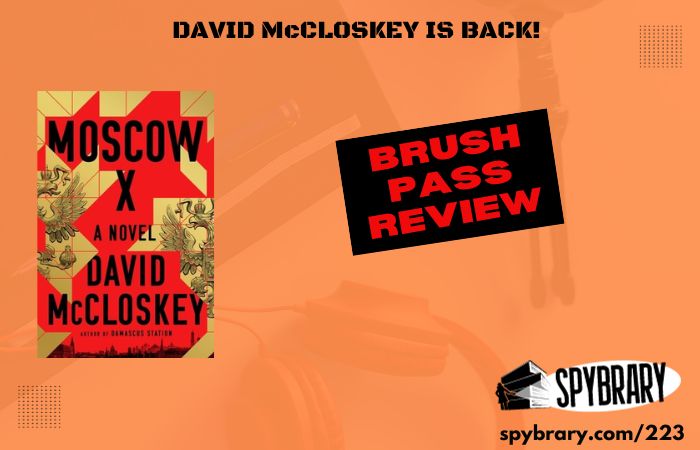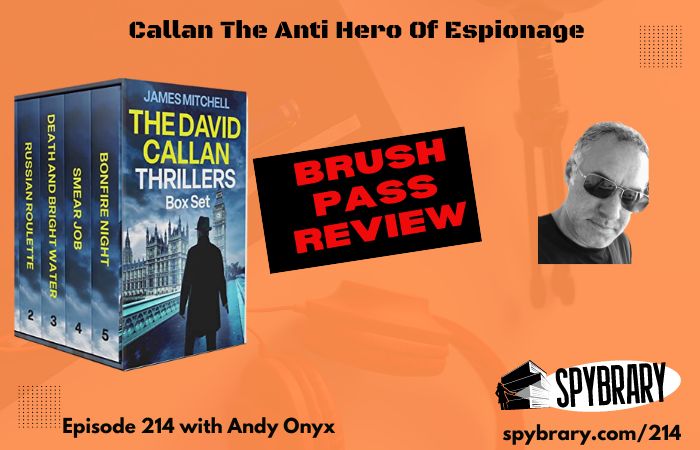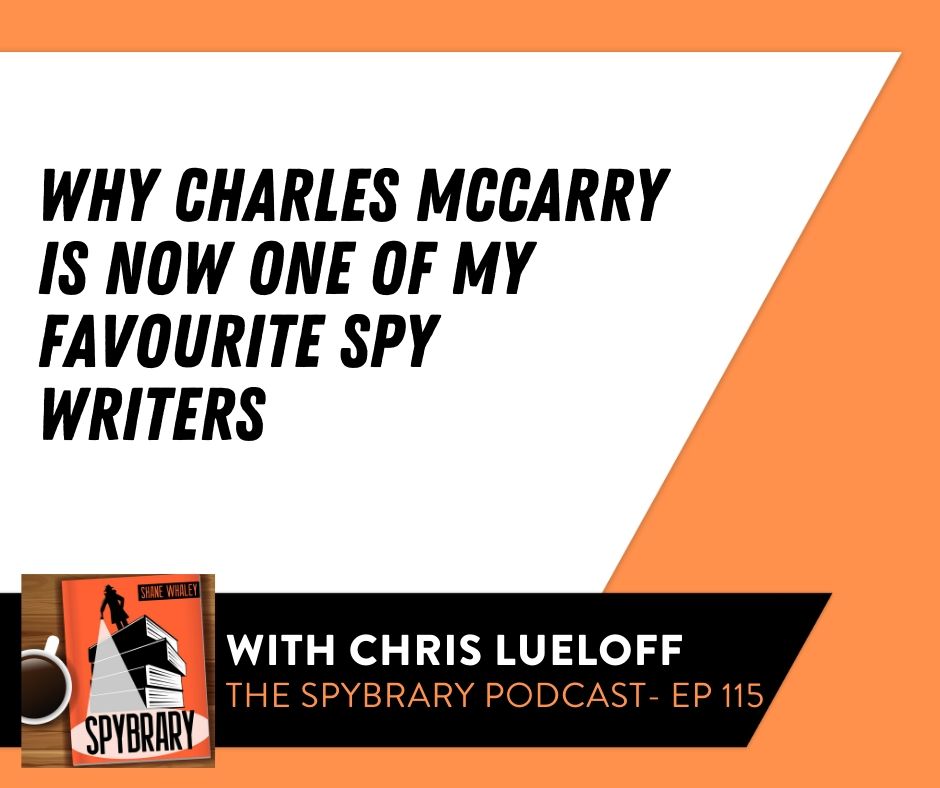
Today we decode an extended brush pass transmission sent in by Spybrary listener Chris Lueloff. Chris recently read 3 Charles McCarry novels and shares with us why he is now one of his favourite spy authors.
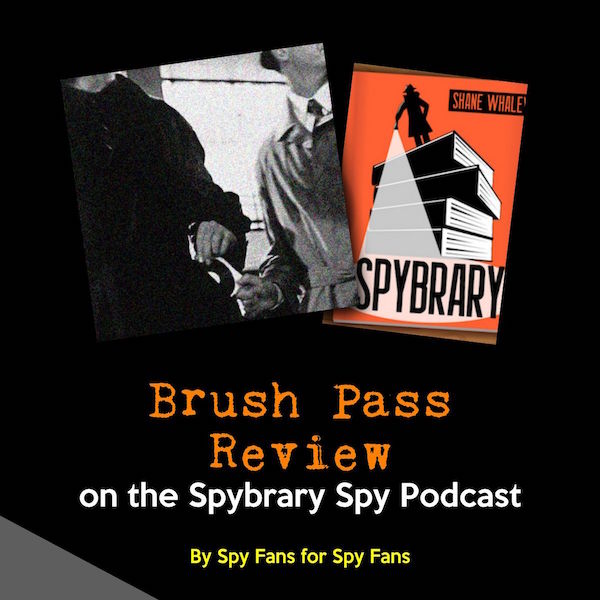
If you love spy books and movies, keep listening. This podcast is for you. This is Spybrary.
It's a Brush Pass quick and simple. You are listening to Brush Pass on Spybrary, quick reviews sent in by spy fans for spy fans.
—– Decoded transcript, excuse errors and typos ——Can't get the staff.
Chris Lueloff coming to you from the great Midwestern state of Wisconsin. Brew City Station. I'm here today to discuss one of the great espionage writers of our time, the late great and very interesting Charles McCarry. I was completely unaware of Mr McCarry until I heard about him after joining the Spybrary Facebook group.
But now after reading three of his books, I can honestly say he is one of my favorite writerstoday on this brush pass. I'd like to tell you a bit about Charles McCarry and give a brief overview of the three books I have read from his Paul Christopher series. Let's start with some of the accolades Charles McCarry received during his writing career from noted publisher editor and proprietor of New York City's the Mysterious Bookshop Otto Penzler.
There was simply no other way to say it. Just the straightforward in arguable truth. McCarry is the greatest espionage writer that America has ever produced. From the daily mail McCarry ranks up there with and a select class of two from the wall street journal.
Charles McCarry's novels are among the best of our time from American political satirist. PJ O'Rourke. McCarry is the best modern writer on the subject of intrigue by the breadth of Alan first, by the fathom of Eric Ambler, by any measure. From Eugene Weber of the Los Angeles times book review, 10 years of intelligence work have shaped the novels of espionage and adventure.
This story spent 10 years of intelligence work have shaped the novels of espionage and adventure. This story spinner crafts works that situate McCarry as the foremost, American fabulous of the trade to paraphrase what the first Duke of Buckingham said about Homer. Just try him once. If you persist to read McCarry's will be all the books you need.
On his own writing, McCarry said the best novels are about ordinary things. Love betrayal, death, trust, loneliness, marriage fatherhood. If you write a political novel, you're writing what you believe instead of what, you know, the themes of my novels have been ordinary things, love death, betrayal, and the American dream.
After I resigned from the CIA intending to spend the rest of my life writing fiction and knowing what tricks the mind can play when the gates are thrown wide open, as they are by the act of writing between the imagination and that part of the brain in which information is stored. I took the precaution of writing a closely remembered narrative of my clandestine experiences.
After correcting the manuscript. I burned it. What I kept for my own use was the atmosphere of secret life, how it worked on the five senses and what it did to the heart and mind. All the rest went up in flames, setting me free henceforth to make it all up in all important matters, such as the creation of characters and the invention of plots with rare and minor exceptions.
That is what I have done. And as might be expected when I have been weak enough to use something that really happened as an episode in a novel, it is that piece of scrap buried in the landfill of the imaginary readers. Invariably, refuse to believe. McCarry was born on June 14th, 1930 in Pittsfield, Massachusetts, and grew up on the family farm.
By his teens. He knew he wanted to be a writer, but could not afford college. And so he joined the U S Army right out of high school in the army. He wrote for Stars and Stripes. While stationed in Bremerhaven Germany, he became editor and a contributing writer for the base newspaper. As his military career was drawing near its end.
One of his army contacts recommended him for a job in the Eisenhower administration. And he soon found himself as a speech writer for labor secretary James P. Mitchell in 1958. Mitchell in turn would recommend him to CIA director Allen Dulles and McCarry was soon in the employee of the agency.
McCarry worked as an undercover officer operating alone. As he roamed throughout Africa, Europe and Asia, he was in the agency when the Berlin wall went up in 1961, he was in and out of Vietnam in November of 1963. He was at an airport in the Congo when a Belgian priest told him about the assassination of President John F Kennedy McCarry remained with the agency for nearly 10 years.
In the 1995 interview with the Boston Globe, McCarry said I traveled a lot in and out of countries in and out of identities. The telephone would ring at midnight and then I would fly out to the Congo, his work involved, covert political action, and a lot of sitting around in hotel lobbies.
He never lived in the same countries in which he worked in 1977, former CIA director, Richard Helms told the Washington post McCarry was under such deep cover. I'd never seen, I'd never even met him until years after he had resigned from the agency. McCarry had some memorable things to say about spies and spying and worked much of it into his books.
Here are a few examples. People are dying to tell their secrets. If you just let people fill the silence, they will tell you the most extraordinary things evil was permanent and it was everywhere. What mattered was that it should be channeled tripped into working for your own side. That was what an intelligence service was of the bond between spies McCarry wrote their friendships were deeper than marriage.
They needed each other's trust as other men need love. Spies are everywhere among us and always have been. It is a very old, old profession while McCarry was unable to discuss his work with the CIA in public in detail, he did share the occasional somewhat anonymous anecdote. One example is about an agent he recruited in Africa who had disappeared and McCarry feared had been killed.
Years later on a London bus, McCarry recognized the man in a business suit using the code name from Africa. McCarry said Peter, they embraced and began to sob each knowing the other had survived their common ordeal.
While working for the agency, McCarry found time to write. In 1960, he took leave of absence from the CIA to write campaign speeches for Republican vice presidential candidate, Henry Cabot Lodge, jr.
During downtime, he wrote travel articles for a variety of magazines. He left the CIA in 1967 to focus on his writing. His first book was citizen Nader, a biography of consumer advocate Ralph Nader published in 1972. His next book was the first and the Paul Christopher series. The Miernek Dossier published in 1973, getting a published wasn't easy after submitting his manuscript to a New York publisher.
He was summoned to the publisher's Park Avenue office. The publisher slammed the manuscript down on his desk and said, this book is a talkie. It's slow. And nobody's going to believe a goddamn word of the plot. Where's the car chase. Where's the torture scene. Where's the sex. Where's the good Russian you call this a thriller?
The publisher sent McCarry home with a bestselling novel to study a month later, McCarry's submitted the manuscript again, without any changes this time it was accepted. I can only write what I know McCarry noted. The Miernik Dossier was the first in a long line of novels McCarry would write over the rest of his life.
The vast majority of them, espionage novels and peppered with his experiences within the CIA is Paul Christopher novels include several books, which trace the history of Christopher and his family. I've read only the first three, but McCarry is definitely a writer. I will never stray far away from. As stated by American spy, Paul Christopher is introduced in 1973 in the Miernik Dossier.
Christopher is an operative for an unnamed American intelligence agency. Most often rich for referred to as the outfit. It's easy to assume. This outfit is the CIA. The layers are peeled from him over the course of the series. And since I have not read the entire series, I still have a lot to learn about him.
What I can tell you is he was born and raised in pre Nazi Germany, and his father was an intelligence agent. Christopher served for the U S during the second world war and met David Patchen his future roommate at Harvard and future boss in the outfit. Christopher is a poet and had one book of poetry published before he became a spy.
He continues to write poetry, but rarely shares it with others. He's highly intelligent and is fluent in several languages. He lives in Rome under his own name, because like Charles McCarry, he does not work in the country. He lives in. There's very little physical description provided of Christopher. We know he is in his late thirties in The Miernik Dossier the series jumps around quite a bit.
And while he is single in 1959, the second book in the series, the Tears of Autumn is set in 1963. Okay. Christopher is now divorced and involved with a new woman book three. The Secret Lovers is set in 1960 and Christopher has a wife. Kathy a devastatingly beautiful woman whose obsession with herself has exceeded only by her desire to crack her husband's secret life and often distant exterior.
The Miernik Dossier takes place during the Cold War and what the preface States could be. 1959. The book is laid out as a collection of DASSI notes, conversation and interview transcripts recorded from, and about the books, five primary characters. These characters are Paul Christopher, who is in deep cover British agent, Nigel Collins, and his girlfriend,
British agent, Nigel Collins, and his girlfriend, the beautifully beautiful seductress Ilona Bentley, the nearly seven foot Tom Muslim Prince kalash of El Qatar. And to do smear Nick, a polar scientist who just might be the leader of a terrorist group. The book of the story takes place during a road trip from Switzerland to the sedan to deliver a new Cadillac to kalash ALK guitar, his father, the Emir of Qatar along the way, Christopher and Collins, while not entirely sure of each other's true livelihood are keeping an eye on mere neck to determine what, if anything, he may be involved in outside his known work as a research scientist with a UN agency.
There are secondary storylines and side adventures, escapades and disasters, along the way, such as an attempt to help mirror Nick's younger sister escaped from behind the iron curtain and a desert attack on their little band of travelers by a group of bandits. The book has plenty of twists and turns something McCarryis adept at and provides the occasional outright shocking scene.
I can pretty well assure you when you come to the end, you will be ready for more. McCarry's next book was the Tears of Autumn. The second book in the Christopher's series and perhaps his most acclaimed work published in 1974. The Tears of Autumn is set in late 1963 and early in 1964 and entails Christopher following his own hunch about who assassinated American president John F. Kennedy.
Christopher goes out on his own against the wishes of the outfit and follows his hunch across Europe, the Congo, and to Vietnam. This book represents McCarry's own thoughts on the assassination hunting. He originally presented it to his publisher as a nonfiction book on this theory, his publisher rejected the idea as journalism and convinced McCarry to fictionalize it.
The tears of autumn introduces us to David Patchen, Christopher's longtime friend and his superior in the outfit. Patchen was severely wounded in world war II and is still impaired with his unblinking unseeing left eye scarred face damaged left arm and leg Patchen has a brilliant calculating mind.
Near photographic memory is one of the highest ranking officers in U S intelligence. And it's based in Washington DC. We also meet Molly. Christopher's Australian assistant, who is now intimately involved with him. We also learn about Christopher's passionate, but troubled relationship with Kelly with Kathy, his ex wife.
McCarrybuilds well-rounded and fascinating characters and provides a good deal of backstory on them in some cases more than he provides on Christopher. I'm not going to give any details of this book away. It is a beautifully written book and as good as the mirror, Nick dossier is this is even better.
McCarry's writing is wonderfully descriptive, and he often paints a picture, both literal and figurative. His prose is realistic and fitting for the characters for which it was written. His plots are complex, but he leads the reader through the story, like a guide at a brewery tour, like someone who has been there before, which he has.
I love this book for fans of spy fiction. This is a must read. It was three years before McCarry's next book was published and that was his third Parker's to her novel, the secret lovers taking a three year step back in time to 1960, the secret lovers gets off to a quick start. As Christopher meets up with an agent in West Berlin to take delivery of a handwritten manuscript from a Russian dissident moments.
After delivering the manuscript to Christopher, the agent is killed in a hit and run accident accident. Of course, that. The secret lovers has Christopher trying to secure the publishing of the manuscript while keeping out of the hands of the Russians and ensuring the safety of the author. And also trying to keep his relationship with his Navy wife intact.
The title of the book is evident as there are a number of secret lovers taken by characters in the book, and it also represents Christopher's description of his work. As his assignments are like secret lovers whose existence he cannot divulge to others. As important as the spy story in this book is the challenging relationship between Christopher and his young and beautiful wife.
Kathy Kathy is stunningly beautiful and very cultured. The daughter of a wealthy family from the American South Kathy is used to being the center of all attention and the object of every man's desire. She knows what Christopher does for a living. And she struggles to cope with so often playing second fiddle to his career and can not truly trust him when she doesn't always know where he is going and who he is with.
McCarrydoes an excellent job in studying the torment. These two go through and Kathy's anguish at being unable to break through. Paul's often cold and distant persona. McCarryis masterful at combining espionage drama, romance, and tragedy. And I would consider the secret lovers to be another must read for fans of spy fiction.
I would like to point out that McCarryhas a way of creating colorful characters. Some almost Fleming ask the mirror, Nick dossier featured the aforementioned kalash elk guitar, the nearly seven foot tall Muslim Prince with a Royal ego and insatiable sex drive to rival his size. The Polish scientists to do smear neck for whom the book is named is an intriguing character.
One part humorous, one part tragic, one part mysterious American short stocky, hairy smelly, and prone to emotional behavior, especially when drunk. The tears of autumn features Christopher's boss and former colleague. Their former college roommate, David Patchen patches description reads like a bond villain.
And I quote as a 17 year old Marine on Okinawa, patching had been wounded by grenade fragments. The left side of his face was paralyzed. You walked with a limp. One of his eyes had been frozen open and he had learned not to blink the other. You wore a black eyepatch when he slept. Patching had no gestures.
He was so still like a hunting animal, lying on the branch of a tree that people would cough in nervous relief. When finally he moved and they saw that he limped tears also features Deezer dimple, a German Dorf who was considered a freak by the Nazi party and who escaped twice from concentration camps.
After the war, he was trained in rope climbing, judo and the clandestine arts, and was proficient in breaking into GRU headquarters in Berlin and photographing top secret documents. Dieter is in just a couple of scenes in the book, but they highly memorable. One of the key characters in the secret lovers is Otto Rothschild, a Russian born operative.
Now an elderly man in poor health, but still brilliant and used as a strategist by the outfit, hypertension and extremely high blood pressure put rough child in a position where he had to choose between imminent death or an operation, which would ruin his body, but keep his mind intact. Rothschild chose the ladder and the operation is sympathectomy leaves him barely able to move or even do simple tasks, such as feeding himself.
Now, mostly chair bound. He is catered to by his young wife, all, he comes up with solutions for the outfits, biggest problems. Well, as I noted at the outset three books is as far as I've gotten in the Paul Christopher series. There are 10 books in all, but unlike most serious, Christopher himself is only a fringe player in some and others.
He is not in at all. The next Christopher book is the better angels published in 1979. Angels follows some of Parker's first cousins, the Hubbards who are also active in the world of intelligence. The Hubbards are involved in a plot to sway a presidential election. The book is best remembered for featuring terrorists, who commandeer airplanes and use them in suicide attacks, something which was considered farfetched back in 1979, the 1982 film wrong is right starring Sean Connery is loosely based on this book.
The next Christopher novel is 1983 is the last supper, which is primarily the story of Christopher's parents in pre world war II, Germany. Next up in the series is 1988. The bride of the wilderness, which features Paul Christopher's ancestors in the 17th century in 1991 came second site in which Paul Christopher meets a daughter.
He never knew he had Shelley's heart was published in 1995 and his SQL to the better angels featuring Christopher's cousins. Once again, tampering with presidential politics. Old boys released was released in 2004 and features some of Christopher's former colleagues stumbling onto a plot involving terrorists.
And it also reveals the fate of Christopher's mother, the finale and the, of her series with 2000 sevens Christopher's ghosts, which tells the story of Christopher's first love and pre world war II, Germany. Like I said, the series jumps around a lot. McCarrywrote four other novels, three of which were standalone spy novels.
1999 is lucky bastard. 2013 is the Shanghai factor in 2015, is the Mulberry Bush. His other novel was a science fiction book arc, which was published in 2011. Carrie also wrote several nonfiction books, including two volumes of retired us army general white house, chief of staff and secretary of state Alexander Hague's memoirs, and also the memoirs of download Regan, secretary of the treasury and white house, chief of staff during Ronald Reagan, Ronald Reagan's presidency.
As you can see nearly all of his books involve spies and espionage, and yet McCarrypreferred to think of himself as a novelist and not a writer of spy fiction in 1995. He stated if I had to do it over again, I would have written novels about a pediatrician anonymously. I'm glad he didn't follow that path.
I can't imagine a pediatrician would have had as many interesting adventures as a spy. McCarry's final novel was the aforementioned, the Mulberry Bush in 2015. McCarrydied on February 26, 2019. At the age of 88, he left behind his wife of 65 years, four children, five grandchildren, and three great grandchildren.
One last thing I would like to note about McCarrywhile he was a lifelong Republican and worked with, and for a number of prominent Republicans. His writing, at least the three novels I've read so far are very even handed this. Isn't the famous Brad Thor or Vince Flynn, regardless of your political affiliation.
I think you'll enjoy him very much with that. I'm going to close this introduction to Charles McCarry. I hope I did him. Justice. I hope you learned something and I hope you'll give the old boy a read. This is Siberian Chris Lula signing off from the great state of Wisconsin, Bruce city station.
Can you pull off a Brush Pass? Send in your review to Shane@spybrary.com.
Thanks for listening to the Spybrary podcast. You don't have to wait for the next episode, join the conversation happening now at facebook.com/Spybrary and on Twitter @Spybrary.
Brush Pass reviews are not literary criticism. Imagine telling a friend about a book you just read and why they should (or should not) read it. Record it on your phone and email it over to me. Brush Pass Spy Book reviews are some of our most popular episodes, why not give it a try and send us one in?
- The Spybrary Facebook Group – tell us what you thought of today's Brush Pass about Modesty Blaise.
